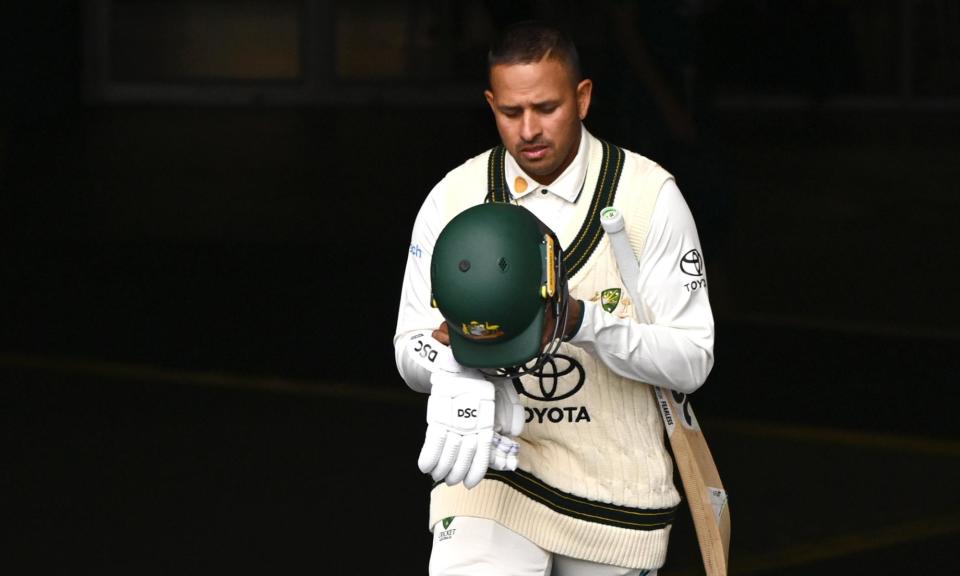
Really, the International Cricket Council could not have done Usman Khawaja more of a favour. Had Australia’s opener been allowed to take the field for the Perth Test wearing shoes with two blandly general phrases about human rights written in pen on the sidewall, a few photos would have been published and that would have been that.
Instead, they banned the move, as well as his subsequent request to adorn his bat with the peace symbol of a dove holding an olive branch. Which has meant that the story has stayed in the news ever since among millions of views for Khawaja’s social media posts on the matter. His aim to publicly protest the ongoing humanitarian crisis in Gaza.
Related: Usman Khawaja criticises ICC for ‘double standards’ after dove logo ban
Indeed, you can ask why he needs to wear a symbol now, when events off the field have generated more attention. But it was always about the principle of using the stage that his ability affords, publicly normalising a gesture of support. Khawaja understands that doing nothing is as much a decision as doing something. Silence and speaking are choices. Passivity is an action. One individual speaking rarely creates change, but in time the collective swell of speech can. The entwined history of Palestine, Israel and Gaza is horrendously gnarled, but that only makes the principle of peace more urgent.
Khawaja wants the right to advance that principle in his place as a cricketer. His dove is a podium contender for innocuous iconography. Marnus Labuschagne has long worn a religious eagle sticker on his bat, which for the ICC is fine because it represents personal belief. They might want to note that Christian morality does include the primacy of human life and of mercy. Apparently that’s fine in the abstract – but in applying such beliefs too specifically, say to the idea that cities should not be bombed for months by military ordnance, beliefs become political.
Cricketers wear black armbands or hold moments of silence for victims of tragedy. They play fundraiser games after natural disasters. But deliberate human violence ordered and enacted by states? That’s politics, made manifest. Humans made those decisions, carried them out, had a rationale. For the ICC, which is essentially an escrow company made to funnel funds between boards and broadcasters, the easiest thing is to ignore it all.
In this aversion lies the particular contradiction – it seems trivial to call it irony, but what is hypocrisy if not irony in action – of an inherently politicised organiser of an inherently politicised sport. National teams playing national teams is political by definition. The ICC as a collection of members is run by the disproportionate might of India’s board, which commands the votes of smaller boards. The Indian board is now an unofficial arm of the national government, stacked with Bharatiya Janata party affiliates and hosting the recent World Cup final in a stadium named after the sitting prime minister.
India and Pakistan won’t tour one another due to political acrimony. Sri Lanka Cricket has as often been run from parliament as the committee rooms. South Africa’s sports minister recently sacked its corrupt cricket board. Bangladesh captain Shakib al-Hasan is running for a parliamentary seat. The ICC’s main sponsor is Aramco, the royal family oil company that drives Saudi Arabia’s economic might and shields it from the consequences of its depredations.
Related: Usman Khawaja challenges cricket’s uncomfortable relationship with activism | Daniel Gallan
Afghanistan’s women’s cricket team dream of being unaffected by politics, having fled the country where women’s sport and education are banned. Meanwhile, the Taliban-backed board just announced it will freeze some of its top men’s players out of all foreign T20 leagues, denying them an income as punishment for wanting flexibility in representing the national team on far lower pay. Zimbabwe cricket bore the despotic fingerprints of Robert Mugabe’s henchmen for years, while Henry Olonga and Andy Flower are still praised for their black-armband protest against Mugabe at the 2003 World Cup. The current ICC would rule that protest illegal.
Eventually it all traces back to international cricket’s proudest legacy – the concerted blockade of apartheid South Africa through the 1970s and 1980s that helped fix that regime’s status as a pariah until change arrived. If the situation recurred today, one has far less confidence that cricket would take as thorough an approach.
The BCCI might argue that there was no value in denying a potential revenue stream and losing a quality member. The ICC chief executive, Geoff Allardice, might say, as he did on Afghanistan, that “as a cricket board, they’re functioning under the laws of their country,” and it isn’t his place to influence spending of the millions handed out each year. And if Khawaja decided to express his opposition with a quiet, symbolic act of protest, he would be told: “Sorry champ. None of that allowed. Get out there and bat.”
Article courtesy of
Source link